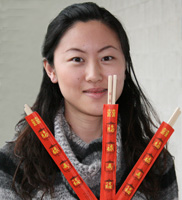In our show today we will be asking ourselves how we can learn about culture and what can be done in the classroom to raise the intercultural awareness of students who prepare for their stays abroad. As an example culture we have chosen China and in particular the Chinese and their food.
absolutely culture-general:
Jack Lonergan tells us how you can teach intercultural communication when you teach a classroom full of learners who have, in fact, the same cultural background and even the same language. Jack gives some very interesting examples of how you can explore a culture in depth even in monocultural classrooms.
absolutely different:
I took the opportunity to ask Mingxia Zhou, one of my business students from the North East of China whether what we call Chinese Food in Europe and what real Chinese people eat in China are more or less the same thing? Mingxia talks about the delicious food in her home country and that the so-called Chinese Food in Europe is not a real substitute. While eating out in Europe can be quite expensive and is seen as a kind of luxury, we find out that eating restaurant food in China is so much cheaper and part of everyday life there – so ordinary people can dine out or order restaurant food to their homes, simply because of the heat or the bad weather outside.
absolutely aware:
We return to Jack Lonergan and listen to how he explains intercultural differences. In his project called The Intercultural European Workplace he makes sure participants perceive intercultural differences by understanding concrete examples. He talks about how a little bowl of soup available at sundown and offered by the university canteen can make all the difference for Muslim students during the fasting period called Ramadan.
absolutely adventurous:
Carina Mayer, who did her internship in Hong Kong working for the Olympics this summer, aimed for a cultural change and new experiences which she would not have been able to experience in Europe. She gives us some insight on her experiences with the Chinese cuisine and seems to have been very unafraid to try everything that the Chinese put on her plate. We hear that in China she often went out to enjoy the vast variety of the real Chinese cuisine with the whole department of the office and this gave her colleagues the opportunity to get to know her more informally than at work.
The next show will be coming to you on 12 December from Anne Fox in Denmark.
So long…stay tuned!
The host of this show is: Dr. Laurent Borgmann
Editor: Jan Warnecke


